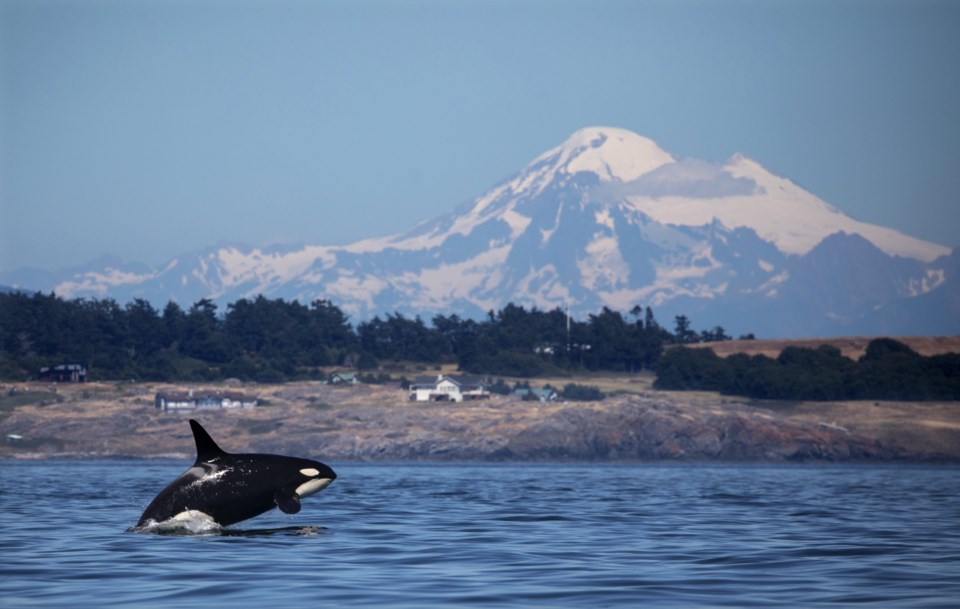The National Energy Board has recommended that the Trans Mountain pipeline expansion project should proceed despite the “significant adverse effects” of oil tankers on the critically endangered population of southern resident killer whales.
Although we disagree with the board’s conclusion, its review of the project’s effects on killer whales is forthright and portrays the severity of the current situation. Already severely stressed and on a potential long-term slide to extinction, these whales cannot contend with additional disruptions and noise from more vessel traffic.
With such a small number of southern residents left, the loss of individuals to food scarcities, ship strikes or any random incident has population-level consequences, as they have no capacity to weather excessive deaths. A 2017 study showed that as many as 69 per cent of pregnancies from 2008 to 2014 failed, likely due to nutritional stress resulting from fewer salmon and the whales’ reduced ability to catch them.
Canada’s Salish Sea is now a patchwork of altered and degraded environments where human-caused harmful effects on marine mammals include damaging levels of underwater noise, diminished prey, toxic pollutants, fatal collisions with ships and disruptive vessel traffic. Cumulatively, these existing threats will escalate because of increasing tanker traffic departing from the Westridge Marine Terminal in Burrard Inlet.
Nothing can currently be done to reduce the effects of tanker noise on southern resident killer whales. Although the federal government says increased tanker traffic is a small percentage of total traffic, an extra tanker per day inbound and outbound would mean the whales spend even more time in the presence of vessels and less time catching their prey.
Trans Mountain agrees that vessels will be a near-continuous presence. The additional tankers will increase the whale’s current exposure to vessels from roughly 85 per cent to more than 95 per cent of the time.
The Raincoast Conservation Foundation served as expert interveners in both rounds of the NEB’s Trans Mountain review, submitting extensive scientific evidence on the effects the project would have on the southern residents. When the federal cabinet initially approved the project, based on the previous NEB recommendation, Raincoast and the Living Oceans Society, represented by Ecojustice, successfully challenged the approval in court because marine impacts were not considered.
The NEB’s new report says that the Trans Mountain expansion is “likely to cause significant adverse environmental effects on the southern resident killer whale and on Indigenous cultural use associated with the southern resident killer whale.” Although cultural losses are harder to recognize than disappearing habitats or declining whale populations, they are likewise important and often concomitant with ecological losses.
Our expert evidence shows that mitigating the effects of project-related shipping on the southern residents might be impossible. Though the NEB has made welcome recommendations to quiet ships, such refits take time. Equally, measures such as slow-downs could simply trade less volume of noise for longer exposure to acoustic and physical disturbance with no net benefit to the whales.
In May 2018, the federal government’s Imminent Threat Assessment described the southern resident population as “small, not stable and declining,” stating “the current demographic distribution of the population does not support the recovery goals identified in the 2011 Recovery Strategy.” Given that the southern residents’ survival is already threatened by status quo conditions, any increases in noise, reduced food or additional premature deaths significantly increases their risk of extinction.
With the NEB recommendation for approval, the federal cabinet must now determine if satisfying the business and political interests associated with Trans Mountain outweigh the prospective extinction of this killer whale population. For ecological, cultural and even economic reasons, we believe this is not an acceptable tradeoff.
The NEB has been candid about the extreme cost of this project to killer whales. Still, it concluded that the supposed short-term commercial benefits of the project are more important to the Canadian public than the wildlife we value or the long-term benefits of a healthy marine environment.
Raincoast contends that we can have prosperity without destructive commerce, cautiously safeguarding our future without compromising the environment that sustains us. We also believe that imperatives to conserve nature are both ecological and moral.
Priceless and irreplaceable, these killer whales are an iconic symbol of Canada’s West Coast. As such, a growing number of Canadians feel compelled to safeguard the intrinsic right of the southern residents to live without harm and suffering in our coastal waters.
Chris Genovali is executive director of Raincoast Conservation Foundation. Misty MacDuffee is Raincoast’s wild-salmon program director. Paul C. Paquet, PhD, is Raincoast’s senior scientist.



